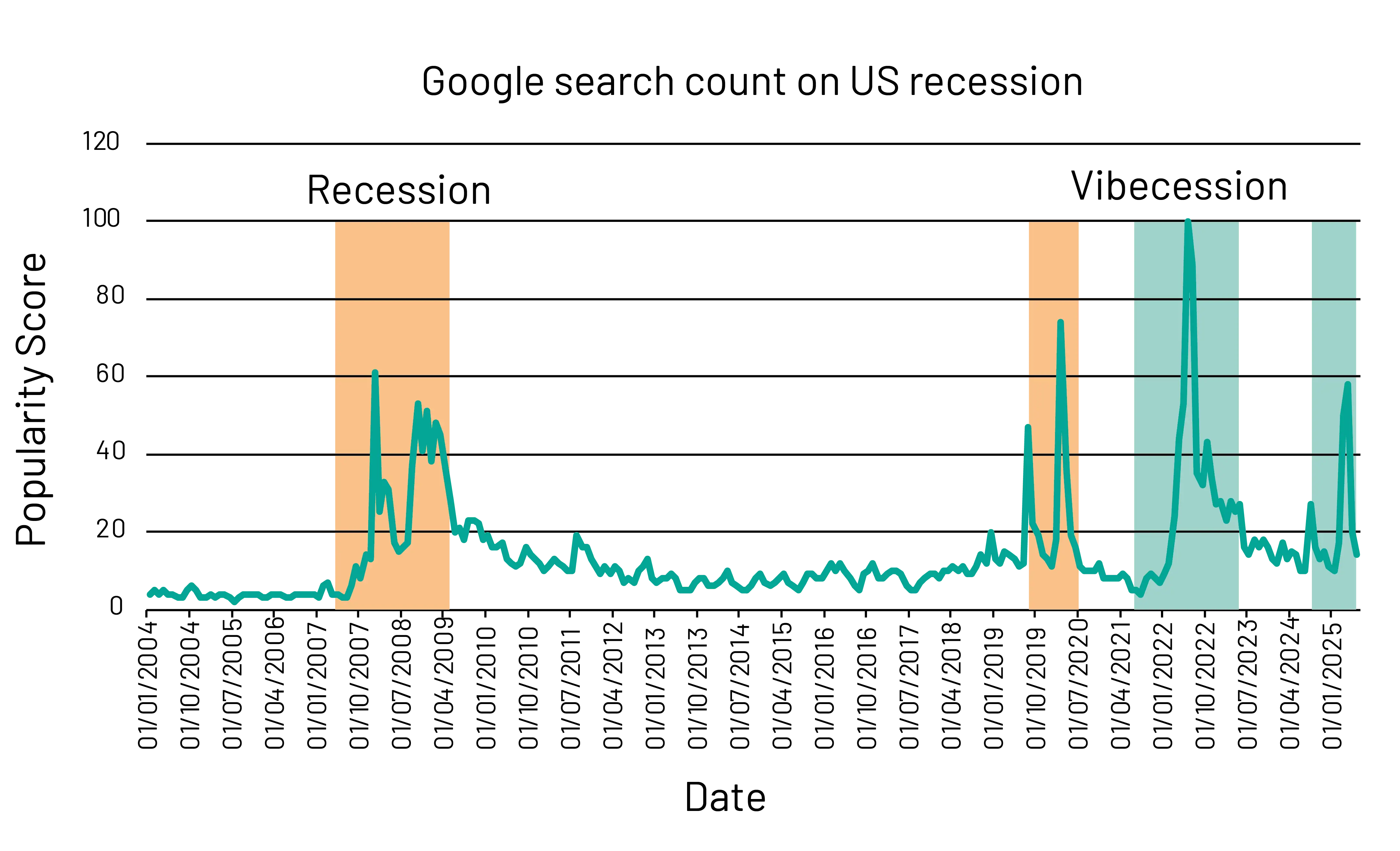
How to invest for the “vibecession”
As an economist, the word “vibecession” makes a part of me curl up and scream.
In an unexpected move this year, social media influencers suddenly decided to get into economics – only recently #recessionindicators was trending. But Tik-Tokers weren’t using traditional measures like the yield curve, but instead giving their “takes” on other potential indicators.
Some actually seemed plausible; like Beyonce tickets still being available with weeks to go. Some were slightly more speculative, such as the rise of new lifestyle trend of eating less actually being cover for financial distress.
Or there’s this left-field suggestion – “Alix Earle’s babysitter bun at Coachella is recession indicator”. I think I recognise all the individual words in there, but I can’t for the life of me get them into a sentence I can stomach. Maybe I should ask a teenage relative. Or maybe I should move on with life. Now, so far, these haven’t been successful predicators of a recession. While social media has taken over our lives, it turns out it’s not telling us any economic truths (except for maybe one presidential account on Truth Social).
Yet let’s not write it off completely. Because what those on social media – and in the boring old real world – are saying is that it might not be a recession, but it feels like one. A poll last year found that 55% of Americans thought the US economy was shrinking (it wasn’t), while 49% thought unemployment was at a 50-year high (it’s not).1 The Vibecession was born.
Recession vs Vibecession
Economists are always on watch for a recession. Most use traditional measures. Yield curve inversion is one of the most famous ones. If short-term bond yields are higher than long-term bond yields, that’s a worry, because it ominously implies that lenders are worried about a risk that’s just round the corner.
A newer measure is the Sahm rule, which notes that when US unemployment rises beyond a certain threshold, it’s not long before a recession follows.
Or there are more sophisticated approaches that bring together the most important data of the economy into one measure called the Leading Economic Index. Watchers of this particular index look for the three Ds (duration, depth and diffusion) for signals of a recession.
However, these “reliable” indicators have a failure in common. They all signalled a US recession in 2022… and it didn’t happen. Economists have been scratching their heads since.
Increasingly, people are looking for alternative data sources. Like rising lipstick sales instead of more expensive luxury products – looking nice for less. Or falling sales of men’s underwear, who are more likely scrimp on ‘non-essentials’ in hard times. Yes, really.2
And then, US economic influencer Kyla Scalon, came up with her take. A combination of the pandemic, inflation, higher rates, surging rents and income inequality made people feel worse off, even if they weren’t. Bad vibes rather than bad growth, so according to Scalon, a “vibecession”.3
A serious look at the vibes
The vibecession has since gained traction; it even found its way into Bloomberg opinion columns, PwC economic updates, and even the Harvard Business Review.4
The research is trying to solve a puzzle: if the US economy is doing great, then why are people so pessimistic? GDP is at all-time highs, unemployment is close to all-time lows and consumers are, in inflation-adjusted dollar terms, spending more than ever. So why then do consumer confidence surveys continue to plumb new depths?
There are three key findings. First is that while overall consumer spending and income growth is at all-time highs, not all Americans are benefitting. Splitting US households into quartiles, the survey finds that while the top two are racing ahead, the bottom two are worse off than they were before the Covid-19 recession.5
The second is the about the politics. Research has shown that voters are more optimistic when the party they voted for are in government, while more pessimistic during administrations of the opposition party. And that sense is only getting more extreme (a recent YouGov poll found similar results for UK households6 which certainly chimes with anecdotal evidence!).
The final factor is where you get your vibes from. The source of information has a big impact on perception. The most optimistic households get their information from traditional news outlets like CNN, while the most pessimistic households get their news from newer media. Ironically, social media has created the vibecession it’s now trying to analyse.
Don’t let the vibes affect your investment plan
We’ve stressed before that a recession shouldn’t affect your investment plans. For example, if you had invested in the FTSE 100 at the peak of the market before the financial crisis in 2008, you’d have made 4% per year more than cash, despite a 50% fall in the interim. Or there’s the point that market drawdowns don’t last that long. Looking at the US market back to the 1920s, we find that the average drawdown lasts less than a year – not much time compared to a standard investment plan.
Or the point that missing out on a few of the best days over 20 years can seriously impact your returns. Don’t move to cash even if you’re worried about a recession.
And what about the vibecession? Same thing. If we take 2022 as the start point of the “vibes” downturn, global equities have outperformed cash by 20% despite a 20% fall on the way. Or this year, where despite wild swings in markets, global equities are positive – with non-US equities strongly up (highlighting that a diversified approach, as we favour, can be even better at weathering these periods).
Excessive pessimism about the future may continue. If you’re on social media, it almost certainly will. News about the tariff war may have died down, only to be replaced by geopolitics. Soon something else will pop up to replace it, whether the forthcoming US fiscal bill, the impact of AI on employment, or simply worries about climate, given how hot it’s been! Whatever does occur, a good investment approach isn’t about the vibes. It’s about the plan.
"There’s a disconnect between the economic fundamentals and people’s perception of the economy – the “vibecession” has been coined to describe this phenomenon."
There’s a disconnect between the economic fundamentals and people’s perception of the economy – the “vibecession” has been coined to describe this phenomenon."

Searches for a ‘recession’ go up during actual recessions, naturally. We saw this happen during the financial crisis of 2008 and also during the shorter, sharper recession driven by the Covid-19 lockdowns in 2020. But we’ve seen concerns spike since then, despite the absence of a recession. There’s a disconnect between the economic fundamentals and people’s perception of the economy – the “vibecession” has been coined to describe this phenomenon.
1 https://www.theguardian.com/us-news/article/2024/may/22/poll-economy-recession-biden
2 https://edition.cnn.com/2022/03/26/economy/recession-underwear-alan-greenspan
3 https://kyla.substack.com/p/the-vibecession-the-self-fulfilling
4 https://hbr.org/2025/01/research-what-explains-the-vibecession
5 https://www.federalreserve.gov/econres/notes/feds-notes/a-better-way-of-understanding-the-u-s-consumer-decomposing-retail-spending-by-household-income-20241011.html
6 https://yougov.co.uk/politics/articles/51906-where-does-public-opinion-stand-after-the-2025-spring-statement
More from 7IM



I confirm that I am a Financial Adviser, Solicitor or Accountant and authorised to conduct investment business.
If you do not meet this criteria then you must leave the website or select an appropriate audience.

